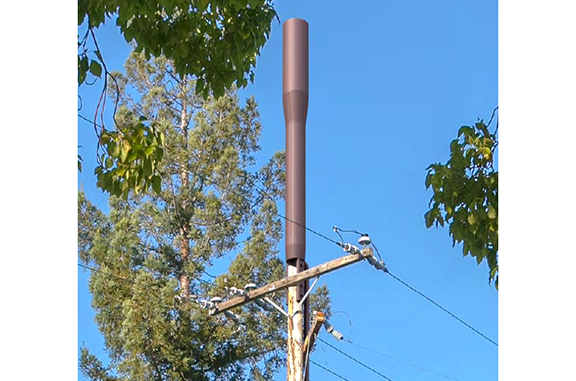
BRADEN CARTWRIGHT
Daily Post Staff Writer
Councilwoman Lydia Kou and Vice Mayor Ed Lauing are proposing new rules for cell nodes installed in Palo Alto by companies like Verizon and AT&T.
Kou and Lauing want the applications to go to the city’s Architectural Review Board instead of Planning Director Jonathan Lait, they said in a memo to the rest of council.
The Architectural Review Board would weigh in on where the cell nodes should go and how they are designed, with a consideration for keeping them away from homes, Kou and Lauing said.
The city’s current process doesn’t give an opportunity for public feedback on cell nodes, Kou and Lauing said.
The cell nodes, appearing like boxes of mechanical equipment, are placed on poles around the city to improve 5G coverage.
Council will have to navigate rules setup by the Federal Communications Commission that limit the ability of cities to reject cell nodes that are needed to improve a network.
The FCC passed an order in September 2018 requiring cities to have rules for cell facilities that are objective and are applied without the exercise of personal judgment.
For example, rules for the dimensions of the cell nodes must be spelled out with specific measurements.
A rule requiring “high aesthetic quality” wouldn’t be objective, City Manager Ed Shikada said in a report for council in April 2019, before council abandoned the subjective rules.
Kou and Lauing said the 9th U.S. Circuit Court of Appeals struck down the “objective” requirement in August 2020, allowing for more subjective rules. “The city can seamlessly return to these standards now,” Kou and Lauing said in their memo.
City Attorney Molly Stump hasn’t reviewed the proposal, city spokeswoman Meghan Horrigan-Taylor said on Friday.
Stump’s review would happen only if council supports the memo on Oct. 21, Horrigan-Taylor said.
City planners are worried about a FCC-mandated shot clock that requires cities to approve applications for cell nodes within 60 to 90 days, the memo said. But Kou and Lauing said companies may be open to voluntarily extending the shot clock.
“In practice, the 60- to 90-day shot clocks are extended frequently — often because the applicant needs more time to get its own application organized and complete internal engineering or planning,” Kou and Lauing said.
Kou and Lauing also want to hire an engineering firm that could assess whether the cell companies truly need exceptions.
Lait acknowledged that city employees lack the expertise to question AT&T and Verizon’s assertions, Kou and Lauing said.
“The city should hire a technical expert that does not work for the telecom industry to quickly make sure applications are complete so that the shot clocks can be halted,” the memo said.
The objective standards aren’t truly objective because Lait allows for exceptions based on their own claims of necessity, Kou and Lauing said.
“Since non-objective (that is, subjective) decisions and tradeoffs are being made all the time anyway, the question is, who should make them: The Planning Director or the ARB? The ARB is best qualified to do this,” Kou and Lauing said.
AT&T spokesman Scott Huscher wouldn’t respond to specific questions about the proposal.
“We look forward to continuing to work with the city of Palo Alto as we invest in and grow our network to serve residents and businesses in the area,” Huscher said in an email.
AT&T has turned in 12 applications to build cell nodes this year, and six of them have been approved, according to the city’s online database.
Verizon hasn’t applied to build cell nodes in Palo Alto since September 2021, the database shows.
AT&T was approved for cell nodes on a pole at 4298 Ponce Drive. The company has pending applications for cell nodes at 1345 Webster St., 973 Embarcadero Road and 300 E. Meadow Drive.
In Los Altos, council passed an ordinance in 2019 that limited where cell nodes could go around schools and neighborhoods. Verizon and AT&T sued, prompting the city to back off its rules and pass a new ordinance in January 2022.

Be the first to comment